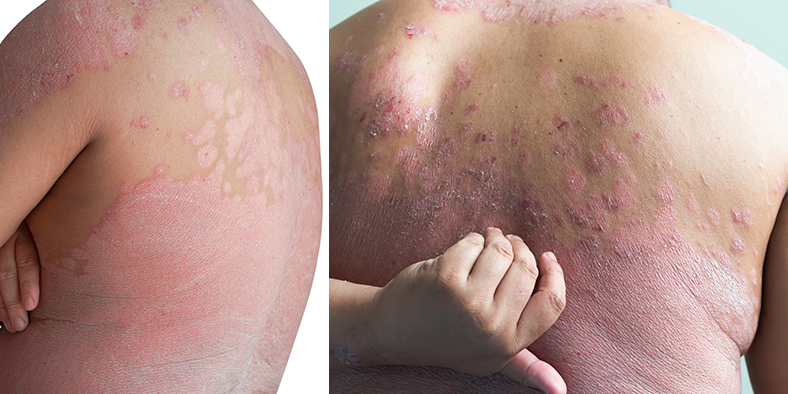In the vast expanse of human physiology, there are numerous dermatological conditions that continue to intrigue and baffle medical researchers and practitioners alike. Among these, a particular variant of a common skin condition called psoriasis, known as inverse psoriasis, is of particular interest due to its peculiar nature and manifestation.
The Hidden Predator: What is Inverse Psoriasis?
Inverse psoriasis is a subtype of the common skin disorder psoriasis, characterized by bright red, smooth, and shiny lesions that occur in the folds of the skin. Unlike plaque psoriasis, the more common form that is marked by raised, red patches covered with a silvery white buildup of dead skin cells, inverse psoriasis lacks the characteristic scaling. The areas commonly affected include the armpits, groin, under the breasts, and other skin folds around the genitals and buttocks.
The underlining cause of inverse psoriasis, like other forms of psoriasis, is an overactive immune system that triggers an inflammatory response, leading to rapid skin cell turnover. The causes that trigger this immune response are complex and multifaceted, often involving genetic, environmental, and individual health factors. Stress, injuries to the skin, certain medications, and infections can all trigger a flare-up of inverse psoriasis.
The Unseen Victims: Who Suffers from Inverse Psoriasis?
Although anyone can develop psoriasis, certain demographics tend to be more susceptible. Inverse psoriasis tends to occur in adults and is more prevalent among those who are overweight or obese. The reason for this correlation lies in the increased skin friction and sweating in body folds, conditions that exacerbate symptoms.
However, it’s not just physical parameters that are at play. People with a family history of psoriasis or with certain genetic markers also have a higher risk of developing the condition. Equally, those with weakened immune systems, such as individuals living with HIV or undergoing chemotherapy, are more susceptible.
The Silent War: Limitations and Effects of Symptoms
Symptoms of inverse psoriasis can significantly affect a person’s quality of life. The pain and discomfort caused by the lesions can limit physical activities and contribute to emotional distress, leading to self-esteem issues and even mental health conditions like depression or anxiety.
The sensitive areas where the lesions form also present unique challenges for management. The moist environment of the skin folds can make the lesions susceptible to fungal and bacterial infections. Moreover, treatment options are limited because the thin skin in these areas absorbs medication more readily, increasing the risk of side effects.
While the lesions themselves are not life-threatening, inverse psoriasis can have indirect effects on overall health. Studies have linked psoriasis to an increased risk of certain health conditions, including cardiovascular disease, certain cancers, and metabolic syndrome.
The chronic nature of inverse psoriasis means that people with the condition often have to manage symptoms throughout their lives. Treatment typically focuses on managing flare-ups, preventing infections, and improving quality of life.
Living with the Unseen: Understanding the Journey
Living with inverse psoriasis can be a complex journey fraught with constant challenges. It is a disease that exists beyond the skin, affecting a person’s overall physical health, self-esteem, and emotional well-being. Yet, it’s important to remember that each person’s experience with inverse psoriasis is unique, just like their symptoms and triggers.
As of now, there isn’t a definitive cure for psoriasis, at least according to “modern medicine”. Treatment involves managing symptoms, reducing inflammation, and trying to prevent triggering flare-ups. Therapies can range from topical treatments to light therapy and systemic medications. It’s a lifelong commitment to managing the condition and adapting to its unpredictable nature.
Unraveling the Cure: Is There a New Dawn in Psoriasis Treatment?
While it’s Western medical organizations believe that psoriasis, in its many forms, remains an incurable condition, the constant advancements in holistic research offer rays of hope for those affected. Holistic healing researchers worldwide are making great strides in uncovering the true cause of psoriasis and thus, how to solve the so called skin disease.
Hope for Tomorrow’s Cure is Here Today
Forget the prescriptions and topical creams. Forget the restricted diets. Forget hiding away out of public view. If you’re sick of continually dealing with your condition and you don’t want to live with it forever, then our new breakthrough psoriasis treatment might be right for you.
Our treatment takes the approach that your psoriasis is just a symptom. Trauma and buried emotions within you is the cause for your auto-immune skin condition. And you might not even be aware they are there.
Want to know more? We ask you to jump into our ground-breaking series entitled “Solving Psoriasis: Empowered Healing Beneath the Surface“. Click the button below to begin.

